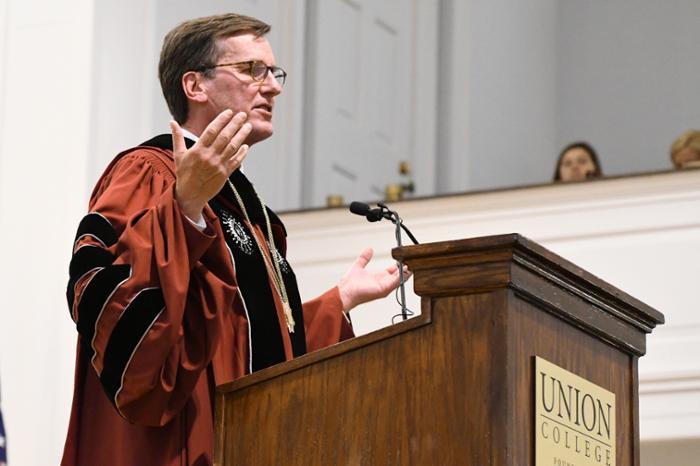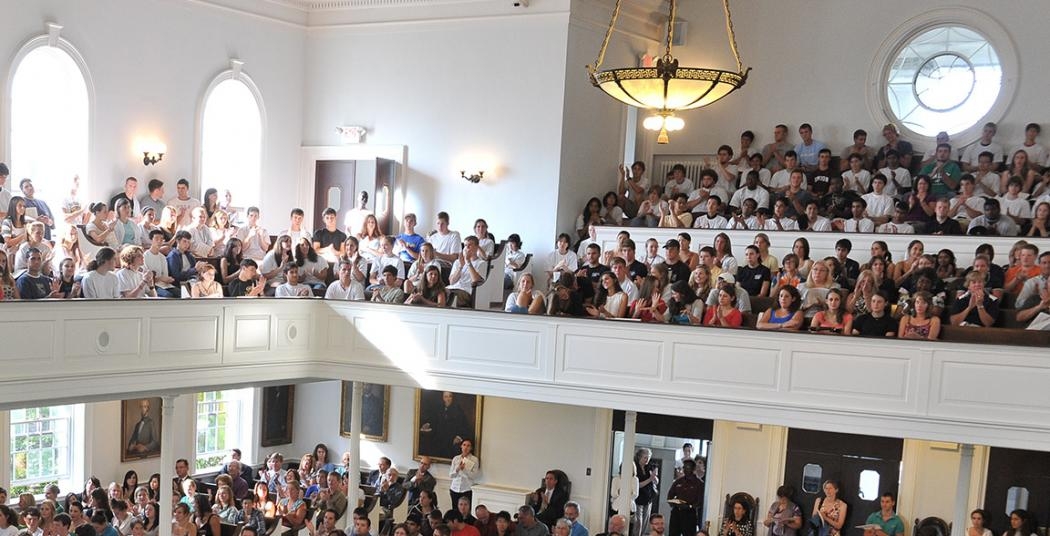Union kicked off its 223rd academic year with a Convocation ceremony that was at times nostalgic, celebratory and cautionary about the challenges ahead.
In presiding over his 12th and final Convocation, President Stephen C. Ainlay recalled an orientation for new college and university presidents at which he was told he should expect to become a walking embodiment of the institution he was about to lead.
“What they didn’t tell me is that I would internalize everything about Union as a part of my very self, a part of who I am, how I see the world, and what I hold dear. I know the same is true for (his wife) Judith.”
Ainlay announced last week that he would step down as president at the end of the academic year. At the start of Tuesday's event, John E. Kelly III ‘76, chair of the Board of Trustees, thanked the Ainlays for their distinguished leadership, prompting a standing ovation from the audience that packed Memorial Chapel.
In his remarks, Ainlay shared his passion for all things Union, including attending arts and athletics events, community service activities and research presentations. He especially savored the myriad conversations and friendships he and Judith built with students, faculty, staff, trustees, alumni and parents since he started July 1, 2006.
“Make no mistake about it; we love Union, we love our work, and we love being members of this community,” he said. “In our view, there is no greater place to go and no institution where we’d rather be. The Board of Trustees of Union College gave us the honor of a lifetime in asking us to serve Union.”
Ainlay said his focus now is on what needs to be done in his final year. That includes completion of the first phase of the new Integrated Science and Engineering Complex. The $100 million project is the most ambitious and largest in the school’s history. The project will also provide opportunities at ceremonial events this year for the College to define liberal education.
The first will be the annual Feigenbaum Forum on Innovation and Creativity at 5 p.m. on Oct. 27 in Memorial Chapel. Pulitzer Prize-winning New York Times columnist and author Thomas Friedman and Kelly, senior vice president, cognitive solutions and research for IBM Corp., will discuss the importance of liberal arts at a time of rapid technological change. More details will be shared later.
He also announced a new addition to Grant Hall featuring the latest in technology. It will allow Admissions staff to have to have face-to-face conversations with students from around the country and around the world, broadening the College’s national and global reach.
“We’ve seen remarkable interest in Union, as measured by applications, early decision requests, visits, open houses and enrollment,” he said. “However, this is not the time for complacency. Instead, this is the time to take full advantage of the momentum we enjoy and strengthen and broaden our admissions efforts. We have a wonderful story to tell, re-defining as we are what it means to offer a liberal education in the 21st century.”
He stressed the need to find ways of speaking to students and their families about what comes after Union while remaining true to the values of a liberal education.
“Concerns with what comes after Union has a deep tradition and history at Union,” he said. “It is why Union devoted itself to ‘practical fields’ (the sciences) at a time when other prestigious institutions were not. It is why Union was the first to introduce engineering into the liberal arts in the mid-19th century. And it’s why Union was early to allow modern languages, along with the classical languages, to fulfill graduation requirements. Caring about what comes next is who we’ve been and who we are, and we have a chance to continue this tradition and attract accomplished students who understand the value of the programs we develop.”
Ainlay also addressed some of the challenges in higher education, including a decline in the number of students in college and other issues that have placed some schools in financial peril.
“Those schools that are the strongest are taking steps to ensure they remain so, and we must as well,” he said. “We must control costs, and by extension tuition increases, while continuing to invest in all that comes with offering a high quality, meaningful and relevant education.”
He touched on some of the recent national events that exposed hate and violence in society, and repeated his message from Convocation a year ago about the need for Union to be a diverse and inclusive community that celebrates and practices civil discourse.
“In the aftermath of the events at Charlottesville, I heard from Professor Emeritus Twitty Styles, who has long toiled to make Union a more inclusive place,” he said. “Dr. Styles argues that each of us needs to ask the question: ‘what have I done on this campus to create an atmosphere of community, inclusiveness and fairness?’ He’s right; each of us needs to ask the question of ourselves and redouble our efforts to strengthen, not tear apart, this community.
In closing, Ainlay noted that while it’s a challenging time in higher education, there are also opportunities.
“Let us commit ourselves to responding – as Union has always done – to the challenges of our day with creativity and innovation and with vision and imagination,” he said. “But also let us also respond with compassion, concern for each other, openness to new ideas, respect for difference and affirmation of our common humanity.”
Also at Convocation, Ainlay welcomed the Class of 2021. The 573 students were selected from record 6,676 applications, one of the most impressive admissions cycles in the school’s history. They hail from 29 states and 16 countries, including Egypt, Greece, Morocco, Nepal and the Netherlands. The class is talented, accomplished and diverse, with 29 percent international or from underrepresented backgrounds. More than 60 percent ranked in the top 10 of their high school class.
Joanne Kehlbeck, associate professor of chemistry, was honored with the Stillman Prize for Excellence in Teaching. Kehlbeck joined Union in 2002. The prize was created by David I. Stillman ’72, Abbott Stillman ’69 and Allan Stillman in honor of Abraham Stillman, father and grandfather. It is given annually to a faculty member to encourage outstanding teaching.
Strom Thacker, the Stephen J. and Diane K. Ciesinski Dean of Faculty and Vice President for Academic Affairs, recognized the students who made the Dean’s List last year. Their names are on a plaque that will be displayed in Reamer Campus Center.
Elyse Clark ’18 received the Hollander Prize in Music, established by Lawrence J. Hollander, dean of engineering emeritus. A soprano, Clark performed Mozart’s “Alleluia” from Exsultate, jubilate, K. 165/158a. A double major in sociology and music, Clark was accompanied on piano by Palma Catravas, associate professor of electrical and computer engineering.
The convocation opened with remarks from William A. Finlay, College marshal and professor of theater and dance; John E. Kelly III ‘76, chair of the Board of Trustees; Peter Bedford, John and Jane Wold Professor of Religious Studies and chair of the Faculty Executive Committee; and Jasmine Nakkab ’18, Student Forum president.
Accompanied by Professor of Music Dianne McMullen, the Class of 2021 led Ode to Ole Union to close the ceremony. An all-campus barbecue followed at various indoor locations on campus due to the rain.

